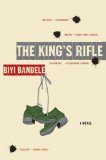Summary | Excerpt | Reviews | Beyond the Book | Read-Alikes | Genres & Themes | Author Bio

 Book Reviewed by:
Book Reviewed by:
Kim Kovacs
Buy This Book
This article relates to The King's Rifle
Major General Orde Charles Wingate was a controversial figure in the British
military during WWII. He was abrasive and opinionated, with ideas about warfare
that struck those around him as either idiotic or sheer genius. Many of his
superiors were impressed by him; others thought him a madman.
Wingate was born in India in 1903. He gained a commission in the Royal Artillery in 1922, beginning a lifelong career in the military. During the years that followed he served in the Sudan and later in Palestine. In 1940-41 he formed a commando unit, "Gideon's Force," which operated on the Ethiopian-Sudanese border, where it was very successful against the Italian Army. He was sent to Burma in 1942 to form a force to combat the Japanese. These soldiers became the Chindits (named after the Burmese word for a mythical winged
lion – "chinthe").
The Chindits were the largest of the allied Special Forces in World War II. They were an international force including British Infantry, Royal Engineers, Burma Rifles, Hong Kong Volunteers, Gurkhas and West African Serviceman including the King's African Rifles, plus many other individuals from other formations. The R.A.F. and the USA First Air Commando provided air support.
There were two Chindit expeditions into the Burmese jungles. The first, in February 1943 ("Operation Longcloth"), consisted of 3,000 men. The second, launched in March 1944, was much more extensive, involving a force of 20,000
soldiers and supplies dropped behind enemy lines by parachutes and gliders to establish fortified bases out of which the Chindits conducted offensive patrol and blocking operations. This deployment, "Operation Thursday," is the subject of The King's Rifle.
The Chindits' objective was to penetrate deep behind the enemy lines through the
Burmese jungle (which the Japanese considered impenetrable at the time). Relying
on the element of surprise, they were to ambush the Japanese troops and cut
their supply and communication lines. Support was to come through parachuted
supplies, with RAF planes taking the place of heavy artillery against the enemy
when Chindit forces were under attack.
The Chindits also establish several landing zones and observation posts, including White City, so named because of the numerous parachutes covering the forest canopy. These strongholds were close to main Japanese travel and supply routes, and consequently were the focal points for the most ferocious fighting between the two forces.
After Wingate's death in a plane crash in March 1944 (less than three weeks
after "Operation Thursday" was launched), the Chindits suffered from a lack of leadership. The force resented their new commander, Brigadier Lentaigne, who had been critical of Wingate's methods. At about that same time, most of the Chindits' air support was redirected to other critical battles, leaving them largely cut off. Lentaigne ordered Chindit troops closer to the enemy line, where constant combat took its toll on the group. Command was subsequently handed over to Joseph Stilwell, who ordered the Chindits to capture several well-defended Japanese positions. In addition to heavy casualties, many of the exhausted soldiers were by this time suffering from malaria, dysentery and malnutrition. On July 8, 1944 Supreme Commander Mountbatten had a doctor examine the remaining force. Of the 2200 men present, only 119 were declared fit for duty. The company was evacuated, with the last Chindit leaving Burma on August 27, 1944.
Filed under Places, Cultures & Identities
![]() This article relates to The King's Rifle.
It first ran in the April 1, 2009
issue of BookBrowse Recommends.
This article relates to The King's Rifle.
It first ran in the April 1, 2009
issue of BookBrowse Recommends.





The Funeral Cryer by Wenyan Lu
Debut novelist Wenyan Lu brings us this witty yet profound story about one woman's midlife reawakening in contemporary rural China.
Your guide toexceptional books
BookBrowse seeks out and recommends the best in contemporary fiction and nonfiction—books that not only engage and entertain but also deepen our understanding of ourselves and the world around us.